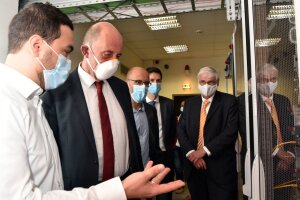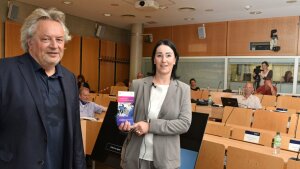News
Computer manager Dr Lars Kühne (from left to right) explains the high-performance computer to minister Wolfgang Tiefensee, university vice president Prof. Dr Georg Pohnert, Dr Robert Axmann (founding director of the DLR institute) and DLR Executive Board member Prof. Dr Hansjörg Dittus.
Image: Anne Günther (University of Jena)Push for big data in science
Finding patterns and connections in the ever-increasing data streams of our time is a great opportunity and at the same time a challenge of the digital society. Scientists at the Institute of Data Sciences of the German Aerospace Center (Deutsches Zentrum für Luft- und Raumfahrt, DLR) in Jena are investigating how to identify hitherto unknown dependencies on climate parameters from the large amount of measurement series from space and on earth, how to visualize undreamt-of relationships and content in data series in a user-oriented way, and how to integrate citizens within the framework of citizen science projects. Machine learning and data mining methods are the tools of the researchers.
With the inauguration of the High-Performance Data Analysis Cluster – with 5,856 cores and a 49 terrabyte main memory – on 9 July 2020, the appropriate high-performance computing infrastructure is now available to give a further boost to research into the analysis of big data in science. The inauguration took place in the presence of Wolfgang Tiefensee, Thuringia's Minister for Economic Affairs, Science and Digital Society, at the Computer Centre of the Friedrich Schiller University Jena. [PM]
The diary of Eva Schiffmann.
Image: Alexander Krünes/Stadtarchiv GothaFacets of Jewish life in Thuringia
Jewish life in Thuringia has a long and varied history and a lively and colourful present. This is to be demonstrated by the activities that the Free State of Thuringia is planning as part of the nationwide theme year »2021: Jewish Life in Germany«. The aim of the nationwide initiative is to make both traces of the past and the diversity of Jewish life today publicly visible and thus take a stand against the resurgence of racism and anti-Semitism.
As part of the 2021 theme year »Nine Centuries of Jewish Life in Thuringia«, a digital education portal will be created in cooperation with the Thuringian State and University Library. One of the projects being worked on at the Friedrich Schiller University Jena is devoted to the didactic unlocking of Eva Schiffmann's diary. The then 13-year-old began keeping a diary in 1925 and recorded everyday events in her home town of Gotha, but also her views on the new image of women or her Jewish faith. In addition to research projects, the university initiates conferences, training courses and events for the general public. The Thuringian State and University Library will present its treasures of Jewish literature in the special exhibition »Tora, Talmud, Tefillot«. [sl]
The European university will involve not only the Jena market, but the entire region.
Image: Jürgen Scheere (University of Jena)Friedrich Schiller University Jena is one of the founders of a European University
The Friedrich Schiller University is one of the universities selected by the EU Commission to co-found a »European University«. In the competition of the same name, the EU has selected 24 university alliances in which 165 universities from 26 countries are involved. The university alliances will be funded with up to 5 million euros for three years.
The Friedrich Schiller University forms the »European Campus of City Universities« alliance together with the universities in Coimbra (Portugal), Alexandru Ioan Cuza in Iași (Romania), Pavia (Italy), Poitiers (France), Salamanca (Spain) and Turku (Finland). The aim of the EC2U (European Campus of City Universities) alliance, for example, is to test new models for joint study programmes and degrees. [AB]
Prof. Dr Heike Kraußlach (right) and Prof. Dr Klaus Dörre present the new ZeTT study.
Image: Anne Günther (University of Jena)Study on Thuringia's economy in the corona crisis
13 percent of Thuringian companies see their existence threatened by the current crisis, 22 percent at least partially. This is one of the worrying findings of a new study of the Centre of Digital Transformation (Zentrum Digitale Transformation, ZeTT), which includes researchers from the University of Applied Sciences Jena, the Friedrich Schiller University, the TU Ilmenau, Working and Living in Thuringia (Arbeit und Leben Thüringen e. V.) and the Institute of the Thuringian Economy (Institut der Wirtschaft Thüringens GmbH, IWT). The team surveyed 388 Thuringian companies in June. Almost two thirds of those surveyed do not expect the tense situation to ease. The scepticism depends on the industry: It's particularly strong in manufacturing, while the IT sector is quite hopeful. Most companies are thinking about changes, but this is rarely underpinned by operational investments. And when there are investments, the funds flow mainly into digital solutions or services. The extensive findings and analyses can be accessed by the public hereExternal link (German only). [AB]



